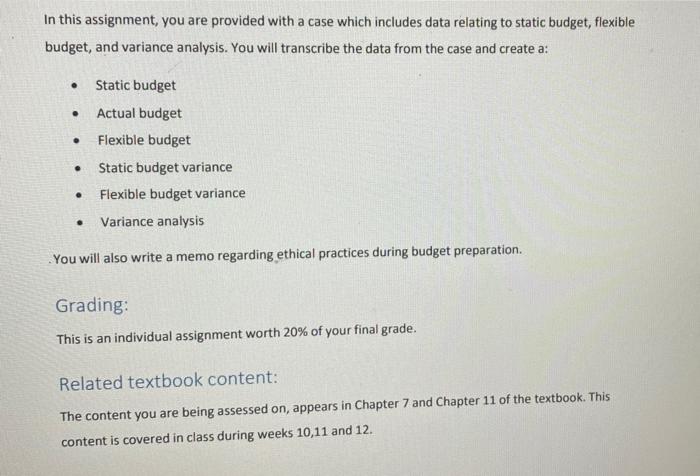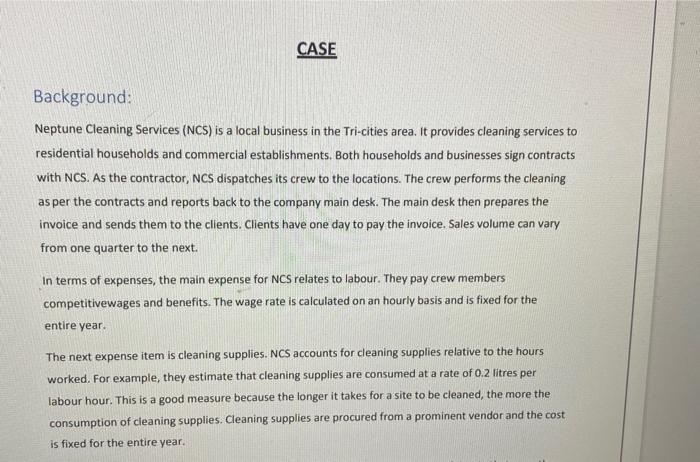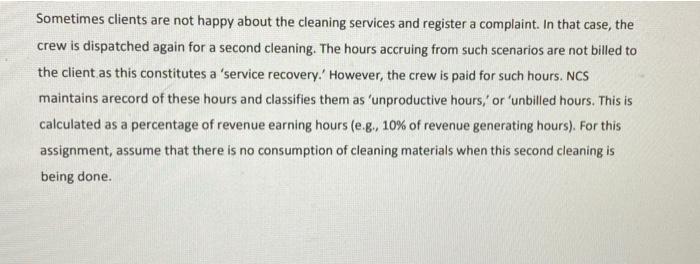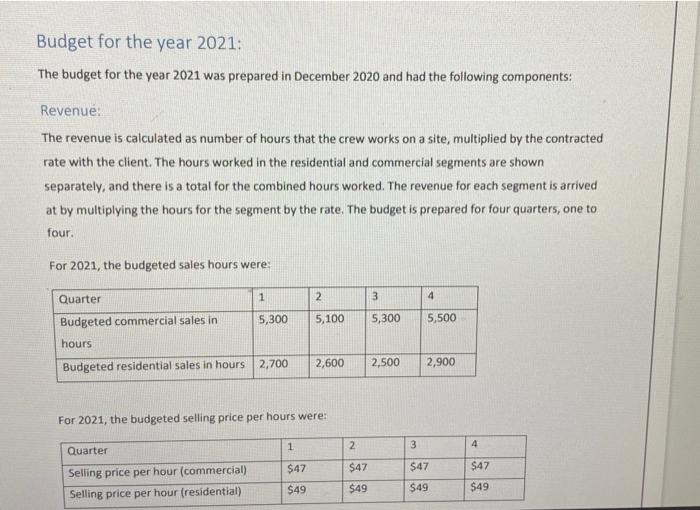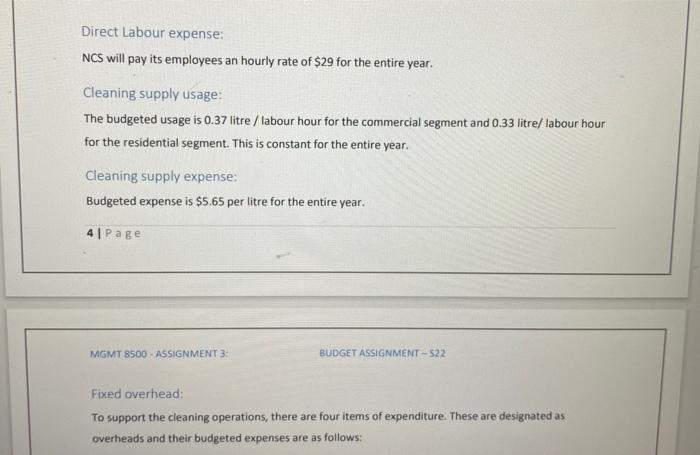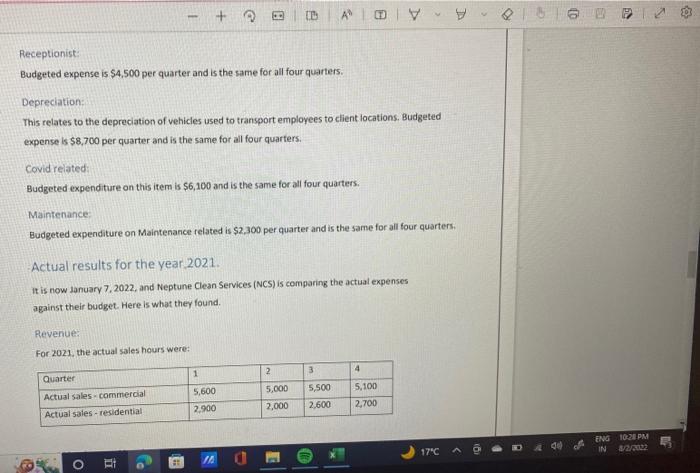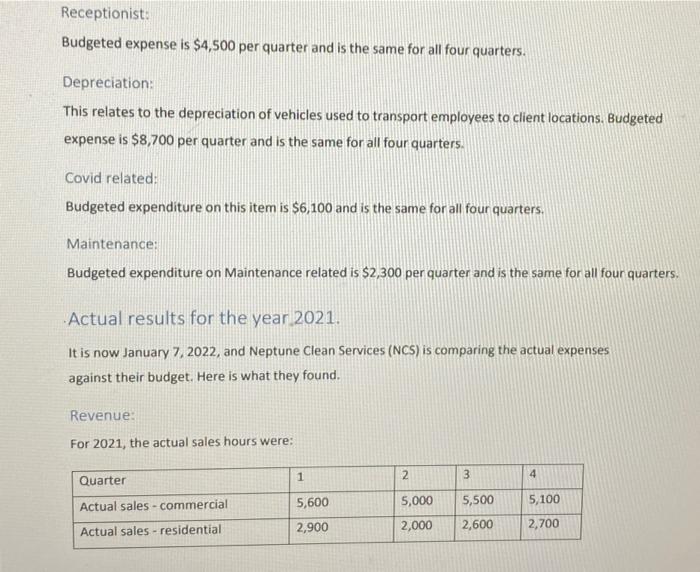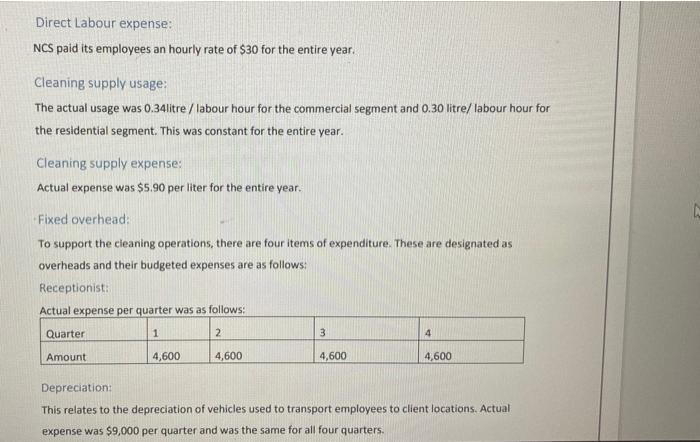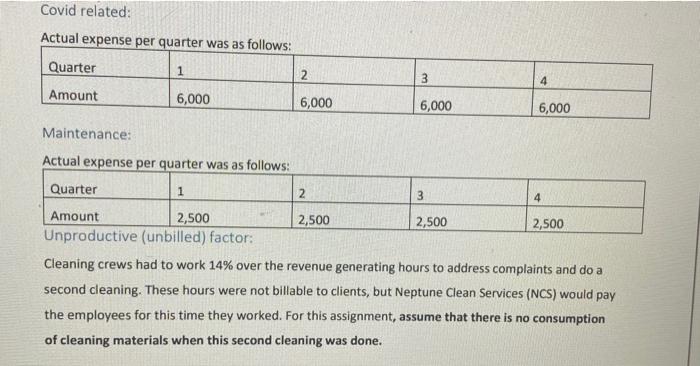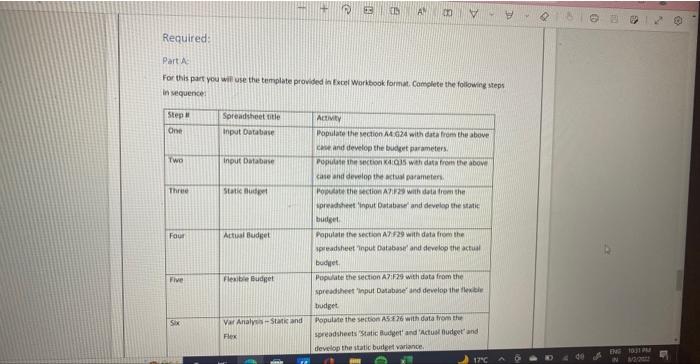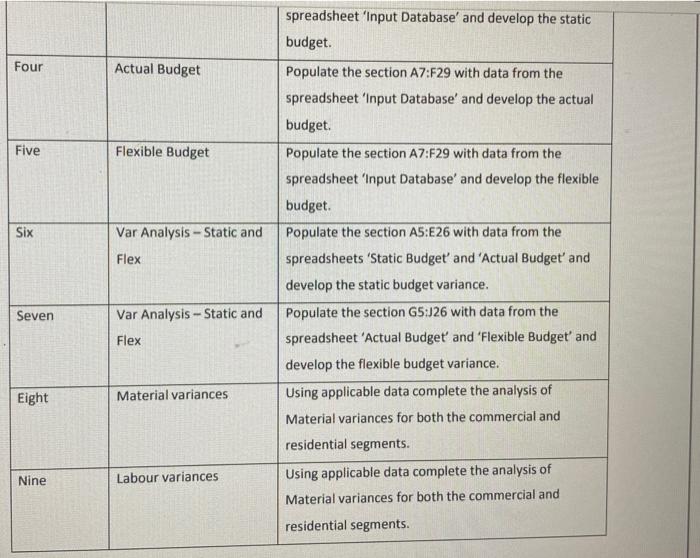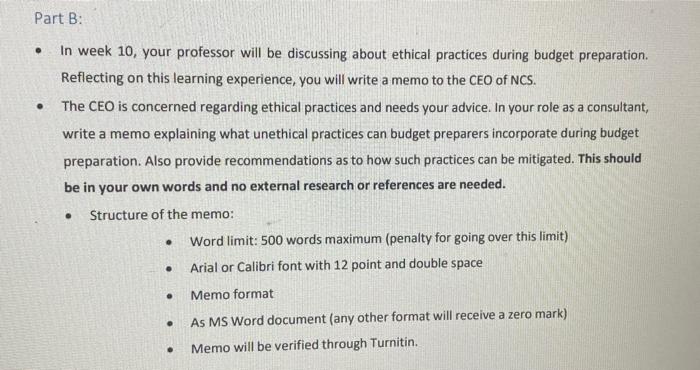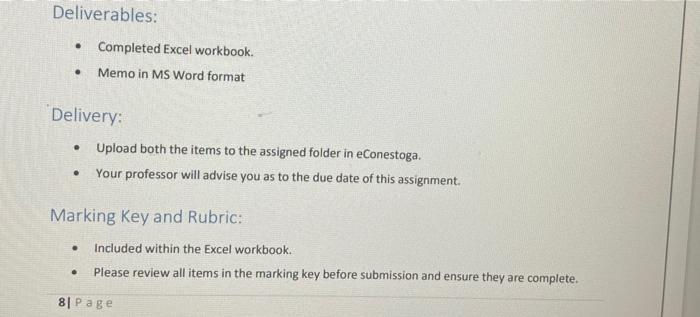In this assignment, you are provided with a case which includes data relating to static budget, flexible budget, and variance analysis. You will transcribe the data from the case and create a: - Static budget - Actual budget - Flexible budget - Static budget variance - Flexible budget variance - Variance analysis You will also write a memo regarding ethical practices during budget preparation. Grading: This is an individual assignment worth 20% of your final grade. Related textbook content: The content you are being assessed on, appears in Chapter 7 and Chapter 11 of the textbook. This content is covered in class during weeks 10,11 and 12. Background: Neptune Cleaning Services (NCS) is a local business in the Tri-cities area. It provides cleaning services to residential households and commercial establishments. Both households and businesses sign contracts with NCS. As the contractor, NCS dispatches its crew to the locations. The crew performs the cleaning as per the contracts and reports back to the company main desk. The main desk then prepares the invoice and sends them to the clients. Clients have one day to pay the invoice. Sales volume can vary from one quarter to the next. In terms of expenses, the main expense for NCS relates to labour. They pay crew members competitivewages and benefits. The wage rate is calculated on an hourly basis and is fixed for the entire year. The next expense item is cleaning supplies. NCS accounts for cleaning supplies relative to the hours worked. For example, they estimate that cleaning supplies are consumed at a rate of 0.2 litres per labour hour. This is a good measure because the longer it takes for a site to be cleaned, the more the consumption of cleaning supplies. Cleaning supplies are procured from a prominent vendor and the cost is fixed for the entire year. Sometimes clients are not happy about the cleaning services and register a complaint. In that case, the crew is dispatched again for a second cleaning. The hours accruing from such scenarios are not billed to the client as this constitutes a 'service recovery.' However, the crew is paid for such hours. NCS maintains arecord of these hours and classifies them as 'unproductive hours, "or 'unbilled hours. This is calculated as a percentage of revenue earning hours (e.g., 10\% of revenue generating hours). For this assignment, assume that there is no consumption of cleaning materials when this second cleaning is being done. Budget for the year 2021: The budget for the year 2021 was prepared in December 2020 and had the following components: Revenue: The revenue is calculated as number of hours that the crew works on a site, multiplied by the contracted rate with the client. The hours worked in the residential and commercial segments are shown separately, and there is a total for the combined hours worked. The revenue for each segment is arrived at by multiplying the hours for the segment by the rate. The budget is prepared for four quarters, one to four. For 2021, the budgeted sales hours were: For 2021 , the budgeted selling price per hours were: Direct Labour expense: NCS will pay its employees an hourly rate of $29 for the entire year. Cleaning supply usage: The budgeted usage is 0.37 litre / labour hour for the commercial segment and 0.33 litre/ labour hour for the residential segment. This is constant for the entire year. Cleaning supply expense: Budgeted expense is $5.65 per litre for the entire year. 4 I Page MGMT 8500 - ASSIGNMENT 3: BUDGET ASSIGNMENT - S22 Fixed overhead: To support the cleaning operations, there are four items of expenditure. These are designated as overheads and their budgeted expenses are as follows: Receptionist: Budgeted expense is $4,500 per quarter and is the same for all four quarters. Depreciation: This relates to the depreciation of vehicles used to transport employees to client locations. Budgeted expense is $8,700 per quarter and is the same for all four quarters: Covid related: Budgeted expenditure on this item is $6,100 and is the same for all four quarters. Maintenance: Budgeted expenditure on Maintenance related is $2.300 per quarter and is the same for all four quarters. Actual results for the year 2021 . It is now January 7, 2022, and Neptune Clean Services (NCS) is comparing the actual expenses against their budget. Here is what they found. Pevenue: For 2021, the actual sales hours were: Budgeted expense is $4,500 per quarter and is the same for all four quarters. Depreciation: This relates to the depreciation of vehicles used to transport employees to client locations. Budgeted expense is $8,700 per quarter and is the same for all four quarters. Covid related: Budgeted expenditure on this item is $6,100 and is the same for all four quarters. Maintenance: Budgeted expenditure on Maintenance related is $2,300 per quarter and is the same for all four quarters. Actual results for the year 2021. It is now January 7, 2022, and Neptune Clean Services (NCS) is comparing the actual expenses against their budget. Here is what they found. Revenue: For 2021 , the actual sales hours were: For 2021 , the actual hourly revenue was: Direct Labour expense: NCS paid its employees an hourly rate of $30 for the entire year. Cleaning supply usage: The actual usage was 0.34 litre / labour hour for the commercial segment and 0.30 litre/ labour hour for the residential segment. This was constant for the entire year. Cleaning supply expense: Actual expense was $5.90 per liter for the entire year. Fixed overhead: To support the cleaning operations, there are four items of expenditure. These are designated as overheads and their budgeted expenses are as follows: Receptionist: Depreciation: This relates to the depreciation of vehicles used to transport employees to client locations. Actual expense was $9,000 per quarter and was the same for all four quarters. Covid related: Actual expense per quarter was as follows Maintenance: Actual expense per quarter was as follows: Cleaning crews had to work 14% over the revenue generating hours to address complaints and do a second cleaning. These hours were not billable to clients, but Neptune Clean Services (NCS) would pay the employees for this time they worked. For this assignment, assume that there is no consumption of cleaning materials when this second cleaning was done. Part d: For this part you an use the tereplate provised in Exwe Woribook format. Couplete the followirg steps in sequence: \begin{tabular}{|l|l|l|} \hline & & spreadsheet 'Input Database' and develop the static budget. \\ \hline Four & Actual Budget & Populate the section A7:F29 with data from the spreadsheet 'Input Database' and develop the actual budget. \\ \hline Five & Flexible Budget & Populate the section A7:F29 with data from the spreadsheet 'Input Database' and develop the flexible budget. \\ \hline Six & Var Analysis - Static and Flex & Populate the section A5:E26 with data from the spreadsheets 'Static Budget' and 'Actual Budget' and develop the static budget variance. \\ \hline Seven & Var Analysis - Static and Flex & Populate the section G5:I26 with data from the spreadsheet 'Actual Budget' and 'Flexible Budget' and develop the flexible budget variance. \\ \hline Eight & Material variances & Using applicable data complete the analysis of Material variances for both the commercial and residential segments. Using applicable data complete the analysis of Material variances for both the commercial and residential segments. \\ \hline \end{tabular} Other guidelines: - Data should be entered in the 'Input Database' spreadsheet only. - For all other spreadsheets, you must use cell references, linking data from 'Input Database' or other spreadsheets. Do not enter data or calculations without cell references. - To identify calculated variances as favourable (F) or unfavourable (U), you need to use 'IF' formula. - In week 10, your professor will be discussing about ethical practices during budget preparation. Reflecting on this learning experience, you will write a memo to the CEO of NCS. - The CEO is concerned regarding ethical practices and needs your advice. In your role as a consultant, write a memo explaining what unethical practices can budget preparers incorporate during budget preparation. Also provide recommendations as to how such practices can be mitigated. This should be in your own words and no external research or references are needed. - Structure of the memo: - Word limit: 500 words maximum (penalty for going over this limit) - Arial or Calibri font with 12 point and double space - Memo format - As MS Word document (any other format will receive a zero mark) - Memo will be verified through Turnitin. Deliverables: - Completed Excel workbook. - Memo in MSWord format Delivery: - Upload both the items to the assigned folder in eConestoga. - Your professor will advise you as to the due date of this assignment. Marking Key and Rubric: - Included within the Excel workbook. - Please review all items in the marking key before submission and ensure they are complete. In this assignment, you are provided with a case which includes data relating to static budget, flexible budget, and variance analysis. You will transcribe the data from the case and create a: - Static budget - Actual budget - Flexible budget - Static budget variance - Flexible budget variance - Variance analysis You will also write a memo regarding ethical practices during budget preparation. Grading: This is an individual assignment worth 20% of your final grade. Related textbook content: The content you are being assessed on, appears in Chapter 7 and Chapter 11 of the textbook. This content is covered in class during weeks 10,11 and 12. Background: Neptune Cleaning Services (NCS) is a local business in the Tri-cities area. It provides cleaning services to residential households and commercial establishments. Both households and businesses sign contracts with NCS. As the contractor, NCS dispatches its crew to the locations. The crew performs the cleaning as per the contracts and reports back to the company main desk. The main desk then prepares the invoice and sends them to the clients. Clients have one day to pay the invoice. Sales volume can vary from one quarter to the next. In terms of expenses, the main expense for NCS relates to labour. They pay crew members competitivewages and benefits. The wage rate is calculated on an hourly basis and is fixed for the entire year. The next expense item is cleaning supplies. NCS accounts for cleaning supplies relative to the hours worked. For example, they estimate that cleaning supplies are consumed at a rate of 0.2 litres per labour hour. This is a good measure because the longer it takes for a site to be cleaned, the more the consumption of cleaning supplies. Cleaning supplies are procured from a prominent vendor and the cost is fixed for the entire year. Sometimes clients are not happy about the cleaning services and register a complaint. In that case, the crew is dispatched again for a second cleaning. The hours accruing from such scenarios are not billed to the client as this constitutes a 'service recovery.' However, the crew is paid for such hours. NCS maintains arecord of these hours and classifies them as 'unproductive hours, "or 'unbilled hours. This is calculated as a percentage of revenue earning hours (e.g., 10\% of revenue generating hours). For this assignment, assume that there is no consumption of cleaning materials when this second cleaning is being done. Budget for the year 2021: The budget for the year 2021 was prepared in December 2020 and had the following components: Revenue: The revenue is calculated as number of hours that the crew works on a site, multiplied by the contracted rate with the client. The hours worked in the residential and commercial segments are shown separately, and there is a total for the combined hours worked. The revenue for each segment is arrived at by multiplying the hours for the segment by the rate. The budget is prepared for four quarters, one to four. For 2021, the budgeted sales hours were: For 2021 , the budgeted selling price per hours were: Direct Labour expense: NCS will pay its employees an hourly rate of $29 for the entire year. Cleaning supply usage: The budgeted usage is 0.37 litre / labour hour for the commercial segment and 0.33 litre/ labour hour for the residential segment. This is constant for the entire year. Cleaning supply expense: Budgeted expense is $5.65 per litre for the entire year. 4 I Page MGMT 8500 - ASSIGNMENT 3: BUDGET ASSIGNMENT - S22 Fixed overhead: To support the cleaning operations, there are four items of expenditure. These are designated as overheads and their budgeted expenses are as follows: Receptionist: Budgeted expense is $4,500 per quarter and is the same for all four quarters. Depreciation: This relates to the depreciation of vehicles used to transport employees to client locations. Budgeted expense is $8,700 per quarter and is the same for all four quarters: Covid related: Budgeted expenditure on this item is $6,100 and is the same for all four quarters. Maintenance: Budgeted expenditure on Maintenance related is $2.300 per quarter and is the same for all four quarters. Actual results for the year 2021 . It is now January 7, 2022, and Neptune Clean Services (NCS) is comparing the actual expenses against their budget. Here is what they found. Pevenue: For 2021, the actual sales hours were: Budgeted expense is $4,500 per quarter and is the same for all four quarters. Depreciation: This relates to the depreciation of vehicles used to transport employees to client locations. Budgeted expense is $8,700 per quarter and is the same for all four quarters. Covid related: Budgeted expenditure on this item is $6,100 and is the same for all four quarters. Maintenance: Budgeted expenditure on Maintenance related is $2,300 per quarter and is the same for all four quarters. Actual results for the year 2021. It is now January 7, 2022, and Neptune Clean Services (NCS) is comparing the actual expenses against their budget. Here is what they found. Revenue: For 2021 , the actual sales hours were: For 2021 , the actual hourly revenue was: Direct Labour expense: NCS paid its employees an hourly rate of $30 for the entire year. Cleaning supply usage: The actual usage was 0.34 litre / labour hour for the commercial segment and 0.30 litre/ labour hour for the residential segment. This was constant for the entire year. Cleaning supply expense: Actual expense was $5.90 per liter for the entire year. Fixed overhead: To support the cleaning operations, there are four items of expenditure. These are designated as overheads and their budgeted expenses are as follows: Receptionist: Depreciation: This relates to the depreciation of vehicles used to transport employees to client locations. Actual expense was $9,000 per quarter and was the same for all four quarters. Covid related: Actual expense per quarter was as follows Maintenance: Actual expense per quarter was as follows: Cleaning crews had to work 14% over the revenue generating hours to address complaints and do a second cleaning. These hours were not billable to clients, but Neptune Clean Services (NCS) would pay the employees for this time they worked. For this assignment, assume that there is no consumption of cleaning materials when this second cleaning was done. Part d: For this part you an use the tereplate provised in Exwe Woribook format. Couplete the followirg steps in sequence: \begin{tabular}{|l|l|l|} \hline & & spreadsheet 'Input Database' and develop the static budget. \\ \hline Four & Actual Budget & Populate the section A7:F29 with data from the spreadsheet 'Input Database' and develop the actual budget. \\ \hline Five & Flexible Budget & Populate the section A7:F29 with data from the spreadsheet 'Input Database' and develop the flexible budget. \\ \hline Six & Var Analysis - Static and Flex & Populate the section A5:E26 with data from the spreadsheets 'Static Budget' and 'Actual Budget' and develop the static budget variance. \\ \hline Seven & Var Analysis - Static and Flex & Populate the section G5:I26 with data from the spreadsheet 'Actual Budget' and 'Flexible Budget' and develop the flexible budget variance. \\ \hline Eight & Material variances & Using applicable data complete the analysis of Material variances for both the commercial and residential segments. Using applicable data complete the analysis of Material variances for both the commercial and residential segments. \\ \hline \end{tabular} Other guidelines: - Data should be entered in the 'Input Database' spreadsheet only. - For all other spreadsheets, you must use cell references, linking data from 'Input Database' or other spreadsheets. Do not enter data or calculations without cell references. - To identify calculated variances as favourable (F) or unfavourable (U), you need to use 'IF' formula. - In week 10, your professor will be discussing about ethical practices during budget preparation. Reflecting on this learning experience, you will write a memo to the CEO of NCS. - The CEO is concerned regarding ethical practices and needs your advice. In your role as a consultant, write a memo explaining what unethical practices can budget preparers incorporate during budget preparation. Also provide recommendations as to how such practices can be mitigated. This should be in your own words and no external research or references are needed. - Structure of the memo: - Word limit: 500 words maximum (penalty for going over this limit) - Arial or Calibri font with 12 point and double space - Memo format - As MS Word document (any other format will receive a zero mark) - Memo will be verified through Turnitin. Deliverables: - Completed Excel workbook. - Memo in MSWord format Delivery: - Upload both the items to the assigned folder in eConestoga. - Your professor will advise you as to the due date of this assignment. Marking Key and Rubric: - Included within the Excel workbook. - Please review all items in the marking key before submission and ensure they are complete
